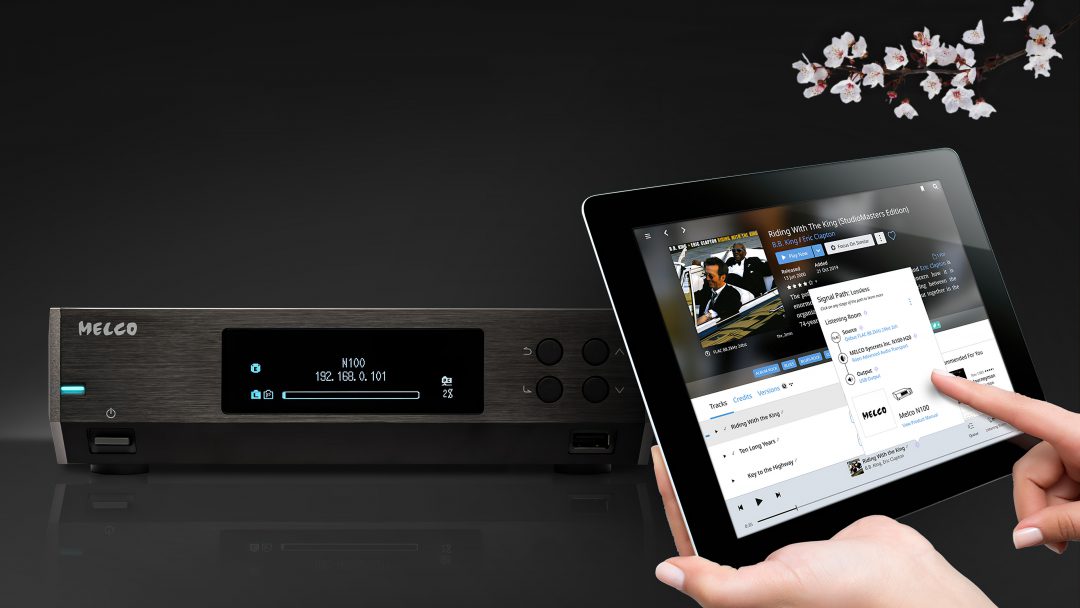With its origins in Buffalo Technology, one of Japan’s largest computer companies, Melco started in 2014 with “The Audiophile NAS Project” in 2014. The goal was to see if you could get audio streaming without the usual compromises the PC world introduces.
Melco: at the beginning of the signal path
Melco does not create complete network players with built-in DAC, but handles the signal at the very beginning of the stream.
According to the press release, Melco has “analyzed and pointed to the elephant in the room when it comes to all audio streaming. How to achieve audiophile sound quality in a DAC or streamer when all surrounding devices such as servers, routers and network drives introduce extra jitter and a higher noise floor? ”
“Fixing it in the mix” is a negatively charged term among many sound engineers. The expression is closely related to “shit in = shit out”, as you can not retrieve lost information in the mix, or correct for large errors. Instead, you put on make-up on something so that your ears can accept it, but the very best result you get if the actual recording is gold in the first place.

Cleanest possible signal from the get-go
The idea of Melco is that when the DSP has to work hard to correct for time errors and electrical noise coming from the network port, then the increased processing of the incoming signal will lead to increased noise floor in the device. Each time the DSP makes a calculation, it snaps into the power supply and creates an imbalance.
“Melco solves this challenge in a sophisticated way through its servers, streaming bridges and audiophile network switches,” one can further read.
Melco, or Maki Engineering Laboratory Company, asks us to use more energy and focus on the infrastructure to get the best out of our network players and DACs. According to the importer, the products convince and “show that we here have great potential for improvement for streaming. For many of us audio enthusiasts, streaming has become the most common playback method. Then we almost have to treat the network as part of the source, or live with the fact that we do not have heard what our system is good for acoustically. ”
Key Features of Melco Servers:
- Sound improvement both through active use (power bridge / Roon endpoint) or passive use (server)
- Separate insulated USB port for forwarding to USB DACs.
- Own isolated network port for hosting forwarding to streamers / network players.
- High quality watches and power supplies.
- UPnP: Audio file NAS technology with local storage (built-in hard disk).
- Melco Intelligent Music library with technology from Songkong and Minimserver.
- Roon Ready
- Built-in support for Tidal and Qobuz
- Remote control via Melco Music HD iPad app and Roon (also mConnect, Bubble UPnP)
- Made in Japan
Expensive products
The most affordable product is called N100 (2,000€), with half width and built-in Tidal, Qobuz and is Roon Ready, and also built-in 2TB hard drive with anti-vibration. The Melco N100 is fanless and has three insulated USB ports for connecting to USB-DAC, Hard Drives or CD drives. For example.

Then comes a big jump in price, to the N10. This has the same width but comes in two cabinets. The N10 has an “extremely precise”, external linear power supply in its own cabinet for minimal interference. The hard drive has increased to 3TB, and the price has increased to a hefty 7,500€.

In addition, there is the pure network switch S100. “After several years with its own filtered ports for streamers implemented in its servers, it was no surprise that Melco finally took the plunge and created its own dedicated audiophile network switch.” Surprise or not, the Melco S100 costs 2,000€ and offers four isolated 100 Mbps ports dedicated to streamer / music player, and another four ports with 1 Gbps speed for other data traffic.

There are several products as well, including full-width servers up to 10,000€ (HA-N1Z / 2EX-S40), but if the product category was for enthusiasts initially, we are probably approaching madness here…
More info: melco-audio-masters.com

